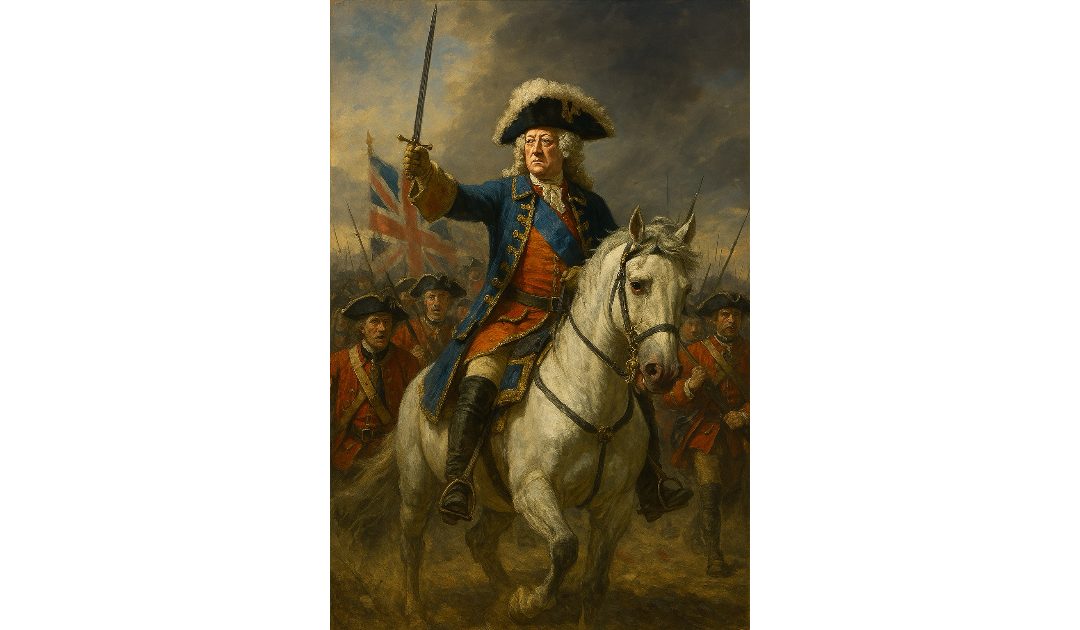On the 27th of June, 1743, King George II became the last reigning British monarch to participate in a battle, (well so far, anyway). King George II, donned in the martial garments befitting a sovereign, commanded his forces during the War of the Austrian Succession, a conflict deeply rooted in the complex web of European alliances and dynastic disputes.
The War of the Austrian Succession (1740–1748) erupted following the death of Emperor Charles VI of the Holy Roman Empire. His daughter, Maria Theresa, was set to inherit his Habsburg dominions through the Pragmatic Sanction, a legal mechanism intended to ensure succession despite her gender. However, this succession was contested by various European powers, notably France, Bavaria, and Prussia, seeking to capitalise on perceived Habsburg vulnerability.
Britain, aligned with Austria, Hanover, and the Dutch Republic, opposed France and its allies. The British interest lay in maintaining the balance of power in Europe and curbing French expansion, which directly threatened British trade routes and political influence.
By mid-1743, British forces had joined the Pragmatic Army, a coalition of British, Hanoverian, and Austrian troops, in the region of Bavaria. Under the nominal command of King George II, the army was tactically directed by the Earl of Stair, a seasoned military strategist. The coalition forces found themselves in a precarious situation near the River Main, trapped between the French army and the riverbanks near the village of Dettingen in what is now Germany.
The French, under the duc de Noailles, had executed an effective encirclement strategy, positioning troops to block the coalition’s retreat while simultaneously deploying artillery along the river to harass the trapped army. Confident of victory, the French believed they had their adversaries cornered.
On the morning of the 27th of June, the coalition forces began their desperate manoeuvre to break free from the French encirclement. The French army, numbering around 45,000 men, faced approximately 35,000 British, Hanoverian, and Austrian soldiers. Despite being outnumbered, the coalition troops were imbued with determination, bolstered by the presence of their king.
The battle commenced around midday with a fierce French assault on the flanks of the coalition forces. The French cavalry launched aggressive charges, aiming to shatter the coalition lines. However, a combination of disciplined infantry volleys and stout resistance thwarted these attempts.
King George II, riding among his troops, displayed commendable courage and leadership. His presence on the field inspired the soldiers, fostering a spirit of unity and resolve. Reports from the battle recount how the king’s horse bolted during the fray, only for the monarch to dismount and continue commanding on foot, an act that further galvanised his troops.
A pivotal moment occurred when the British and Hanoverian infantry, forming disciplined lines, unleashed devastating musket volleys against the advancing French troops. The cohesion and training of the British ‘Redcoats’ proved decisive, as they repelled repeated French attacks with remarkable tenacity.
Eventually, the French lines began to waver under the relentless pressure. The duc de Noailles, faced with mounting casualties and the collapse of his tactical advantage, ordered a withdrawal. The coalition army successfully broke the encirclement, turning a precarious situation into a hard-fought victory.
The Battle of Dettingen resulted in approximately 2,000 French casualties, while the coalition forces suffered around 1,000 losses. Despite the tactical victory, the strategic situation in the region remained complex, and the war would continue for several more years.
For Britain, Dettingen held symbolic significance beyond the battlefield. It underscored the nation’s commitment to its continental allies and demonstrated the effectiveness of its military forces. The personal involvement of King George II added a layer of national pride, immortalising the event in British history.
Culturally, the battle inspired artistic and musical tributes. Most notably, the composer George Frideric Handel composed the “Dettingen Te Deum” and “Dettingen Anthem” to commemorate the victory, both celebrated for their grandeur and patriotic fervour.
Today, the Battle of Dettingen is remembered not only for its military aspects but also for its unique historical footnote as the last time a British king led troops in battle. It symbolises a bygone era when monarchs adorned the battlefield, sharing the perils and triumphs of warfare alongside their soldiers.

